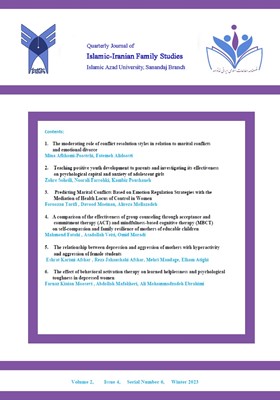A comparison of the effectiveness of group counseling through acceptance and commitment therapy (ACT) and mindfulness-based cognitive therapy (MBCT) on self-compassion and family resilience of mothers of educable children
Subject Areas : Islamic-Iranian Family Studies Journal
mahmod fatahi
1
![]() ,
Asadollah Veisi
2
,
Asadollah Veisi
2
![]() ,
omid moradi
3
,
omid moradi
3
1 - PhD student in Family Counseling, Sanandaj Branch, Islamic Azad University, Sanandaj, Iran.
2 - Assistant Professor of Family Counseling, Payame Noor University, Tehran. Iran.
3 - Associate Professor of Family Counseling, Sanandaj Branch, Islamic Azad University, Sanandaj, Iran
Keywords: resilience, Acceptance and Commitment Therapy (ACT), mothers of educable mentally-retarded children, mindfulness-based cognitive therapy (MBCT), self-Compassion,
Abstract :
Aims: The purpose of this research is to compare the effectiveness of group counseling with acceptance based on commitment and cognitive therapy based on mindfulness, self-compassion, and family resilience of mothers of children in education. Method:This research was semi-experimental with a pre-test and post-test with a control group and a follow-up period of 5 months. Sampling was done by simple random sampling. From the list of the statistical population of mothers of exceptionally educated students in the two cities of Mallard and Shahryar in the year (1401-1400), (36) people were selected using random numbers and in two experimental groups of cognitive therapy based on mindfulness and therapy based on Acceptance and commitment and a control group were included. Self-compassion(Neff, 2003) and family resilience (Sixbey, 2005) questionnaires were used as research tools. The method of data analysis was covariance analysis to compare means. The software (SPSS 22) was used for data analysis. Findings:The results showed that both methods, therapy based on acceptance and commitment and cognitive therapy based on mindfulness in the way of group counseling, have an effect on increasing self-compassion and family resilience of mothers of educated children.The effect of acceptance and commitment therapy on increasing self-compassion (59.6%) and mindfulness-based cognitive therapy (27.9%) was compared to the control group. (P<0.001 and F=106.891) and the effect of acceptance and commitment therapy on increasing resilience (81.5%) and cognitive therapy based on mindfulness (45.9%) compared to the control group. (P<0.001 and F=106.891. Conclusion: According to the findings of this research, it is possible to use the method of group counseling, therapy based on acceptance and commitment, and cognitive therapy based on mindfulness to increase self-compassion and family resilience.
_||_


